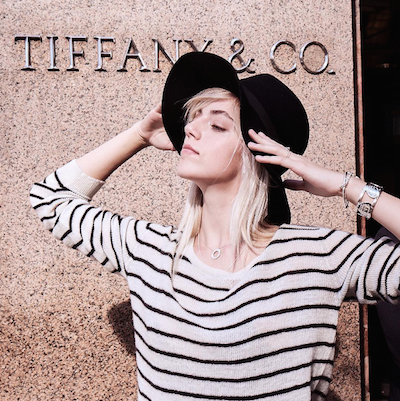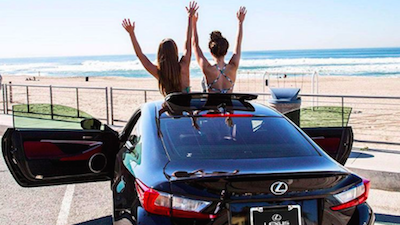 Gisele Bundchen for Chanel Beauty Talks
Gisele Bundchen for Chanel Beauty Talks
Social media behavior varies across industries, with product categories showing different levels of maturity and diverse priorities, according to a new report from Brandwatch.
Whether brands like it or not, consumers are creating a conversation around their name on social media, giving brands an opportunity to learn about their audience by listening. Brandwatch's rankings put these conversations in context, allowing brands to see their own activity and that of their category against other industry's conversations.
"Luxury fashion brands use social media differently than other industries in that...they don't," said Alex Jones, lead researcher for Brandwatch.
"Their activity on Twitter makes up less than 1 percent of the conversation," she said. "On average, they have the most followers on Twitter out of all the industries we analyzed, but because they fail to post social content, they get among the fewest @mentions each day and below average replies and retweets."
The Social Outlook analyzes 115.5 million social mentions across 15 industries, looking at content directed at 450 brands. Brands are ranked based on social visibility, general visibility, net sentiment, reach growth and engagement and content.
Catching up
The luxury fashion industry’s aversion toward social media is softening, with those who have actively strategized for social channels seeing the best results.
Luxury fashion tied with alcohol brands for the highest net sentiment score. The brands included in this industry were also given high scores for audience growth and the quality of brand content, judged by consumer engagement with posts.
Chanel topped the fashion rankings courtesy of general media visibility and growth in reach. Louis Vuitton came in second with the best social visibility out of the top five.
Rounding out the list were Dior, Cartier and Tiffany & Co.
 Pyper America Smith for Tiffany's #LoveNotLike campaign
Eight out of 10 luxury brand Facebook posts include a photo, the highest percentage of any industry.
Luxury labels have the highest average number of Twitter followers, at around 2.2 million. The higher a brand’s follower count, the more of their total conversation that is apt to be taken over by consumers.
Both fashion and automotive brands are among the industries with the highest portion of their overall conversation stemming from retweets.
While luxury fashion labels and automakers have similar average numbers of Facebook followers, the automotive brands tend to have greater engagement with their posts.
A key area of opportunity for brands is responding to consumer mentions. Luxury brands and automakers were some of the slowest at replying on Twitter, hovering between 10 and 15 hours on average.
Across the sample in almost every industry, Brandwatch found companies that did not reply to a single mention during the three-month study.
Returning a message to a consumer is one way to show them that they are valued and inspire loyalty.
Motor mentions
The automotive industry is facing increased competition from ridesharing services and car sharing. In the meantime, car companies have an opportunity with younger generations, with three-quarters of millennials planning to buy or lease a vehicle in the coming years.
While social media would be an ideal channel to reach this next generation, many automakers appear to be taking a supporting role in driving the conversation. Only 1 percent of automotive mentions on Twitter came from brands, lower than the average 4.2 percent.
Looking at the consumers posting about cars on Twitter, Brandwatch found that most were from men and the audience was also interested in technology and business.
Most commonly mentioned in posts were a vehicle’s power and its speed, with other attributes such as comfort and fuel efficiency mentioned less often.
Pyper America Smith for Tiffany's #LoveNotLike campaign
Eight out of 10 luxury brand Facebook posts include a photo, the highest percentage of any industry.
Luxury labels have the highest average number of Twitter followers, at around 2.2 million. The higher a brand’s follower count, the more of their total conversation that is apt to be taken over by consumers.
Both fashion and automotive brands are among the industries with the highest portion of their overall conversation stemming from retweets.
While luxury fashion labels and automakers have similar average numbers of Facebook followers, the automotive brands tend to have greater engagement with their posts.
A key area of opportunity for brands is responding to consumer mentions. Luxury brands and automakers were some of the slowest at replying on Twitter, hovering between 10 and 15 hours on average.
Across the sample in almost every industry, Brandwatch found companies that did not reply to a single mention during the three-month study.
Returning a message to a consumer is one way to show them that they are valued and inspire loyalty.
Motor mentions
The automotive industry is facing increased competition from ridesharing services and car sharing. In the meantime, car companies have an opportunity with younger generations, with three-quarters of millennials planning to buy or lease a vehicle in the coming years.
While social media would be an ideal channel to reach this next generation, many automakers appear to be taking a supporting role in driving the conversation. Only 1 percent of automotive mentions on Twitter came from brands, lower than the average 4.2 percent.
Looking at the consumers posting about cars on Twitter, Brandwatch found that most were from men and the audience was also interested in technology and business.
Most commonly mentioned in posts were a vehicle’s power and its speed, with other attributes such as comfort and fuel efficiency mentioned less often.
 UGC from Lexus' Golden Opportunity campaign
Lexus was top in Brandwatch’s automobile rankings, with perfect scores in engagement and social visibility putting it ahead of second place Tesla. While ranked fourth behind Mercedes-Benz, Audi’s net sentiment was the highest of any automaker’s.
The automotive category as a whole came in second in the rankings, placing behind only the NBA.
"Playing to consumers' interests will help make content resonate," Ms. Jones said. "There are general interests, but it's possible—also, necessary for specific brands—to find complex audience groups using segmentation. This allows brands to discern interest in luxury cars versus luxury fashion.
"Posting intelligent content is important," she said. "What are your goals? To get content shared to the most people, or to get engagement from your audience?"
Social outlook
In 2016, 76 percent of online adults in the United States engage with companies on social media, up from 68 percent a year, while consumers’ social savviness is also on the rise, according to new research from Forrester Research.
UGC from Lexus' Golden Opportunity campaign
Lexus was top in Brandwatch’s automobile rankings, with perfect scores in engagement and social visibility putting it ahead of second place Tesla. While ranked fourth behind Mercedes-Benz, Audi’s net sentiment was the highest of any automaker’s.
The automotive category as a whole came in second in the rankings, placing behind only the NBA.
"Playing to consumers' interests will help make content resonate," Ms. Jones said. "There are general interests, but it's possible—also, necessary for specific brands—to find complex audience groups using segmentation. This allows brands to discern interest in luxury cars versus luxury fashion.
"Posting intelligent content is important," she said. "What are your goals? To get content shared to the most people, or to get engagement from your audience?"
Social outlook
In 2016, 76 percent of online adults in the United States engage with companies on social media, up from 68 percent a year, while consumers’ social savviness is also on the rise, according to new research from Forrester Research.
